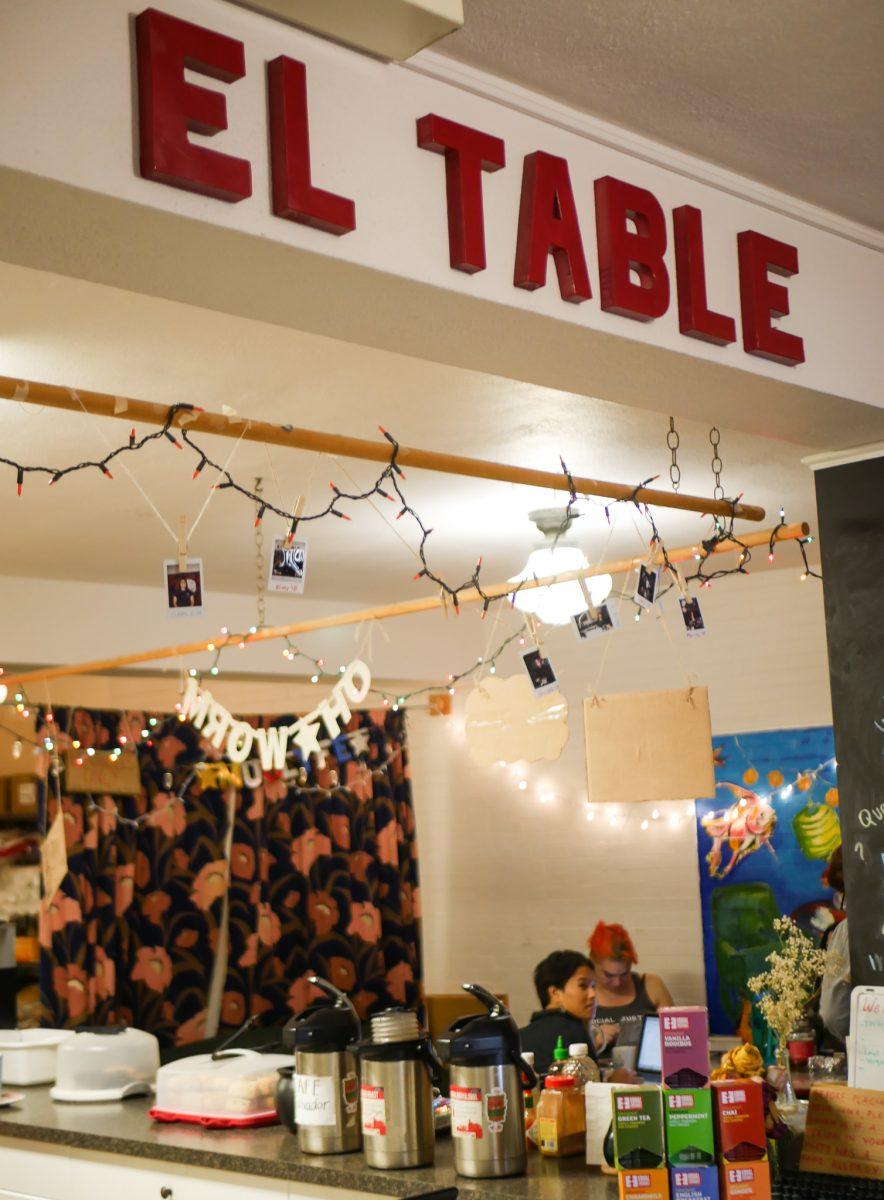Loved today for its coffee, sandwiches and social atmosphere, El Table has had a steady, significant influence on the everyday life of Wellesley siblings since 1904.
El Table’s name is not in fact a bastardization of the Spanish word for table, which is “la mesa,” but is actually short for “Elevator Table” — it was literally a single table by the elevator in the old College Hall before it was burned down in 1914. It has been a beloved hotspot for political conversation since its inception. In a satirical “Wellesley Dictionary” published in The Wellesley News in 1918, “Elevator Table” was defined as “the political hang-out of the college.”
In 1925, The Wellesley News reported on the funeral held for the College Hall building and for El Table. “A procession marched through the Administration Building to a well remembered spot [El Table] — A spade, tombstone, and prayer made the funeral authentic and the many bystanders assisted with real enthusiasm,” the article said, indicating how much El Table represented the College’s identity.
After the fire, it had a brief stint as a lemonade stand on Chapel Lawn nicknamed the “Hen Coop.” It was a place to buy tickets to campus events, catch up on College news and stay connected to the Wellesley community. “The ‘Hen-Coop’, built so swiftly and guaranteed [to last] only for three years, served the College for seventeen years,” reported The Wellesley News in 1939. It found its current home in the basement of Founders in the spring of 1931.
As the political climate of the country took a turn in response to the World Wars, El Table’s purpose and presence on campus was — for lack of a better word — elevated. It became a campus center of political discussion, military fundraising and information about the world outside of the serene Wellesley campus.
According to The Wellesley News in 1943, World War II rations affected El Table’s offerings, but its menu was still considered a reprieve from dining hall food. By 1944, El Table’s brownies were its most famous pull factor — customers tore through twenty dozen brownies a day and thirty half pints of milk. “This is the vital sustenance of Wellesley girls who sleep through breakfast, of the office workers, of Mr. Montgomery, of the janitors, and of those with the ten-thirty-to-ten-forty hunger,” reported Mary Alice Cullen ’46 in a 1944 issue of The Wellesley News.
Throughout the turmoil of the 1960s and the Vietnam War, El Table remained a hub for the politically active student body. It featured bulletin boards for student organizations to advertise events, bus tickets and good food, which made it a perfect place with “the right moods” for almost anything, according to a Wellesley News article in 1966.
The coffee and sandwiches El Table is known for today were introduced around the 1970s. A flyer advertising the co-op in 1980 boasted, “Over ten forms of caffeine!”
Today, El Table continues to be one of Wellesley’s favorite hang out spots for good conversation, food and “moods” that are attributed to the history and siblinghood of the place. Pallavi Sethi ’22 has already established herself as a regular.
“I love the coffee — the [El] Salvador one,” she said.
Sethi also acknowledges that the environment has made a huge difference in her experience.
“They have really chill music all the time and it’s at the perfect volume so it’s not like you can’t work. Just sitting here, the tables, the art, the lights, make it feel really cozy and vibrant. Overall, I think it’s great … If you want to work on something or chill with your friends, it’s the perfect location … It’s convenient to come here between classes if your classes are in the academic quad,” she said.
The students running El Table have mastered the art of creating the perfect vibe, and it is not by accident. They make it a mission to keep operations cooperative and inclusive.
“The passion El Tablers have for the co-op is absolutely the sheer driving power behind its relevance on campus. We love El Table so much, and that love inspires us to go the extra mile to ensure El Table’s longevity,” said Kim Burton ’20.
Like the many students that have been going to El Table for generations, Sethi can tell the difference.
“It feels like each sandwich is made with care and love. It tastes like somebody legitimately put effort to make this sandwich for me. Even though it’s kind of like a fast food place, they’re not throwing orders out there,” she said.
Though committed to making quality sandwiches, El Table has not lost touch with its politically active history.
“Each co-op has basic principles like autonomy, community and shared power to name a few, but each co-op is ‘flavored’ by the members and the community. So each year El Table is different. In short, what makes us different changes from year to year, but generally we pride ourselves in our commitment to social justice, sustainability and student power,” said Ni’Shele Jackson ’19.






